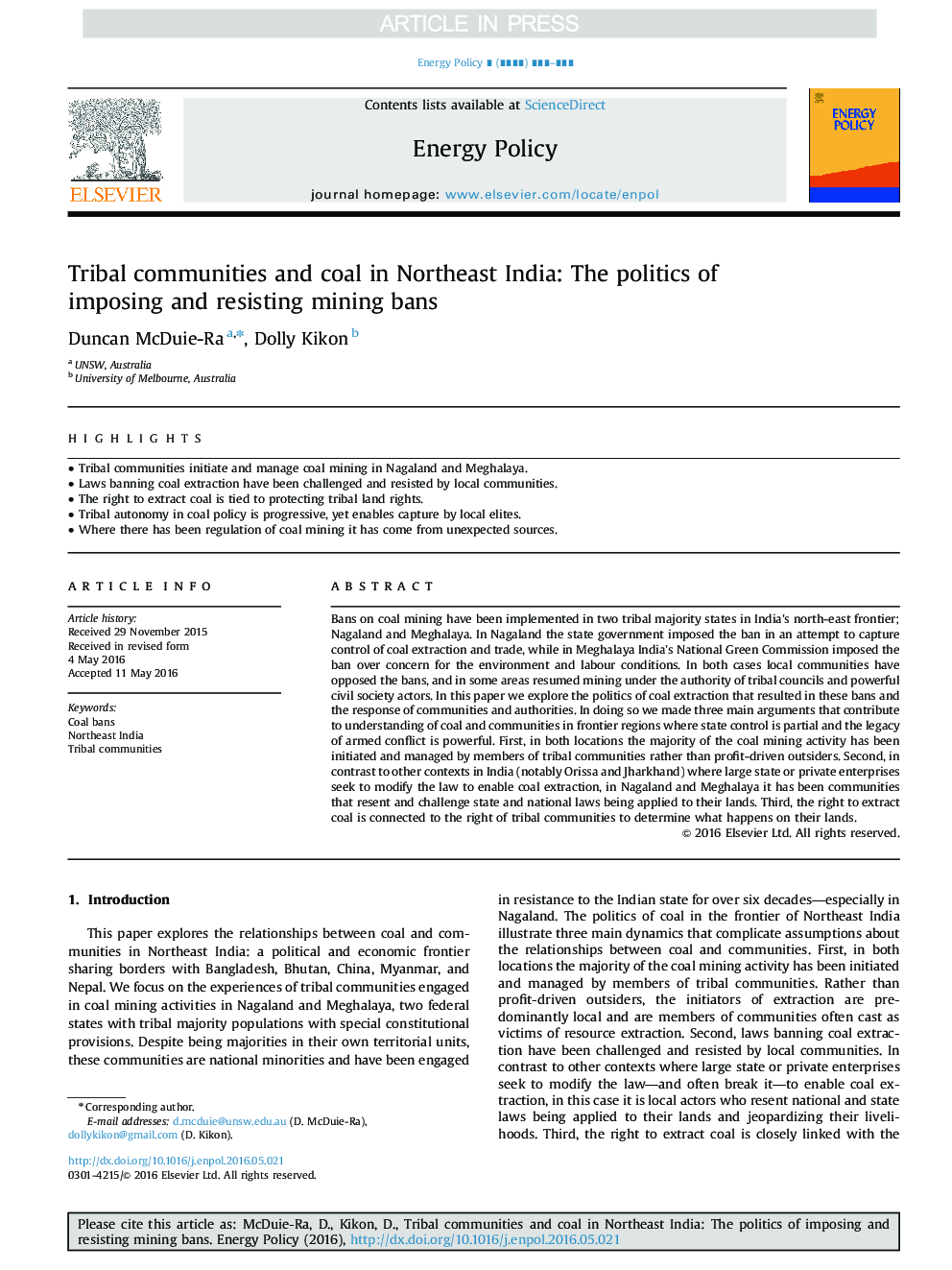| کد مقاله | کد نشریه | سال انتشار | مقاله انگلیسی | نسخه تمام متن |
|---|---|---|---|---|
| 5106242 | 1481259 | 2016 | 9 صفحه PDF | دانلود رایگان |
عنوان انگلیسی مقاله ISI
Tribal communities and coal in Northeast India: The politics of imposing and resisting mining bans
ترجمه فارسی عنوان
جوامع قبیله ای و زغال سنگ در شمال شرقی هند: سیاست اعمال و مقاومت در معرض معادن
دانلود مقاله + سفارش ترجمه
دانلود مقاله ISI انگلیسی
رایگان برای ایرانیان
کلمات کلیدی
ممنوعیت زغال سنگ، شمال شرقی هند، جوامع قبیله ای
ترجمه چکیده
ممنوعیت استخراج زغال سنگ در دو کشور اکثریت قبیله ای در مرز شمال شرقی هند اجرا شده است. ناگالند و مگالایا. در ناگالند، دولت ایاالت متحده ممنوعیت را در تلاش برای کنترل کنترل استخراج زغال سنگ و تجارت تحمیل کرد، در حالی که در مگالایا، کمیسیون ملی سبز هند، ممنوعیت نگرانی برای محیط زیست و شرایط کاری را اعمال کرد. در هر دو مورد، جوامع محلی با ممنوعیت ها مخالفت کردند و در بعضی مناطق، معادن تحت مجوز شوراهای قبیله ای و بازیگران قدرتمند جامعه مدنی را از سر گرفتند. در این مقاله، سیاست های استخراج زغال سنگ را بررسی می کنیم که منجر به این ممنوعیت ها و واکنش جوامع و مقامات می شود. در این راستا ما سه اصل اصلی را که به درک زغال سنگ و جوامع در مناطق مرزی که کنترل دولتی جزئی است و میراث منازعات مسلحانه قدرتمند است، کمک می کند. اول، در هر دو محل، اکثریت فعالیت های معدن زغال سنگ، توسط اعضای جوامع قبیله ای آغاز شده و توسط متصدیان سودآور هدایت شده اند. دوم، در مقایسه با سایر زمینه ها در هند (به ویژه اریسا و جارکند) که در آن شرکت های بزرگ دولتی یا خصوصی به دنبال تغییر قانون برای فعال کردن استخراج زغال سنگ هستند، در ناگالند و مگالایا، جوامعی بوده اند که به قوانین دولتی و ملی اعتراض می کنند سرزمین هایشان سوم، حق استخراج زغال سنگ به حق جوامع قبیله ای متصل می شود تا مشخص شود که در سرزمین هایشان چه اتفاقی می افتد.
موضوعات مرتبط
مهندسی و علوم پایه
مهندسی انرژی
مهندسی انرژی و فناوری های برق
چکیده انگلیسی
Bans on coal mining have been implemented in two tribal majority states in India's north-east frontier; Nagaland and Meghalaya. In Nagaland the state government imposed the ban in an attempt to capture control of coal extraction and trade, while in Meghalaya India's National Green Commission imposed the ban over concern for the environment and labour conditions. In both cases local communities have opposed the bans, and in some areas resumed mining under the authority of tribal councils and powerful civil society actors. In this paper we explore the politics of coal extraction that resulted in these bans and the response of communities and authorities. In doing so we made three main arguments that contribute to understanding of coal and communities in frontier regions where state control is partial and the legacy of armed conflict is powerful. First, in both locations the majority of the coal mining activity has been initiated and managed by members of tribal communities rather than profit-driven outsiders. Second, in contrast to other contexts in India (notably Orissa and Jharkhand) where large state or private enterprises seek to modify the law to enable coal extraction, in Nagaland and Meghalaya it has been communities that resent and challenge state and national laws being applied to their lands. Third, the right to extract coal is connected to the right of tribal communities to determine what happens on their lands.
ناشر
Database: Elsevier - ScienceDirect (ساینس دایرکت)
Journal: Energy Policy - Volume 99, December 2016, Pages 261-269
Journal: Energy Policy - Volume 99, December 2016, Pages 261-269
نویسندگان
Duncan McDuie-Ra, Dolly Kikon,
